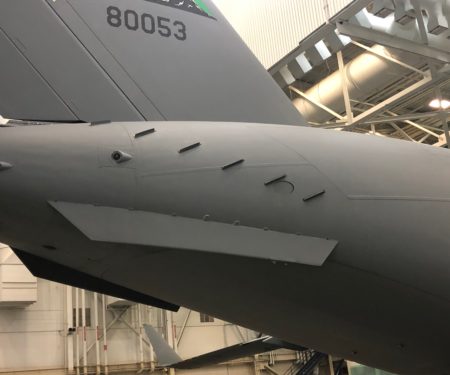Radar Sweep
Weapons & Platforms: B-21 Raider
The B-21 Raider page in Air & Space Forces Magazine’s Weapons & Platforms database is live, with essential details on the new bomber and an ever-growing pool of stories about the stealthy aircraft that made its public debut Dec. 2.
Fog Machines, Short Lenses, No iPhones: Managing the B-21′s Rollout
When it came time to roll out the Air Force’s new stealth bomber, the B-21 Raider, the line between public transparency and revealing too much information was barely visible to the naked eye. “Down 2 inches,” a Northrop Grumman-jacketed security official firmly said to one of half a dozen press photographers, whose camera tripod slightly exceeded a 6-foot guideline. The unveiling of the Northrop Grumman-made bomber at Air Force Plant 42 in Palmdale, Calif., on Dec. 2 was a tightly stage-managed event, one designed to conceal as much as reveal.
Explosions at Russian Air Bases May Change Several Nations’ Calculations
Explosions at the Dyagilevo and Engels airbases deep within Russia suggest that Ukraine can strike the very outskirts of Moscow—and, perhaps, that U.S. officials may need to revisit their rationale for withholding various long-range weapons. On Dec. 5, the Russian Ministry of Defense said modified versions of the Soviet-era Tupolev Tu-141 Strizh reconnaissance drones had struck air bases at Engels, 372 miles from Ukrainian-controlled territory, and at Dyagilevo, 122 miles southeast of Moscow. It blamed the strikes on “the Kyiv regime.”
The Military Still Has No Good Way to Spot Extremist Recruits and Troops on Social Media
The Pentagon still hasn't implemented a social media vetting process to identify extremists trying to join the ranks despite a high-profile push to root out the activity by Defense Secretary Lloyd Austin, according to a new think tank report released Dec. 6. Social media posts could provide the military with important indicators of who is participating in violent domestic extremism, the Center for a New American Security, based in Washington, D.C., said in the report.
After Months of Drama, France, Germany Resolve Industrial Fight over Next-gen Fighter
After two false alarms in as many weeks, Dassault Aviation and Airbus have finally reached an industrial agreement for the study phase of the Future Combat Aircraft System, removing the blockage that brought the program to a standstill in summer 2021. French Minister for the Armed Forces Sébastien Lecornu tweeted that “this project is a concrete illustration of the cooperation we are conducting at European level on defense and armaments, in which France plays a central role.”
How Does Military Life Affect Teens? Landmark Study Aims to Find Out.
About 40,000 military members and veterans with children ages 11 to 17 are being invited to participate in a Defense Department study that looks at the health and well-being of military-connected youth and their families. These parents are getting their invitations by email and through postal mail. Parents will be provided information about signing in to take the confidential online survey. The Study of Adolescent Resilience, or SOAR, is part of the largest and longest-running health research in military history, the Department of Defense Millennium Cohort Study.
Defense, Commerce Departments Select Companies to Prototype Space Traffic Management Solutions
The Office of Space Commerce and the Department of Defense announced Dec. 6 they have selected six commercial firms to prototype space traffic data platforms that track objects and medium and geostationary Earth orbits. COMSPOC Corp., ExoAnalytic Solutions, Kayhan Space, KBR, NorthStar Earth & Space Inc., and Slingshot Aerospace received contracts for a pilot project to demonstrate the use of commercial technologies for space traffic management. The Space Data Association also is participating in the project.
Kessel Run Reveals New Plan for Speedier DevSecOps Deliveries
Kessel Run, the Air Force team building a software development factory to power future military operations, unveiled a new procurement vehicle that shapes how it’ll buy commercially available DevSecOps capabilities through mid-2027. A portmanteau of development, security, and operations, DevSecOps refers to an evolving software engineering approach that seeks to combine all three of those elements throughout services’ production lifecycle and enable continuous delivery and integration where changes happen regularly over time. It’s key to the functions of Kessel Run, which matured from an innovation-pushing experiment for accelerating military software deployments to a congressionally-mandated program of record over the past five years.
DOD Details $1.26B in Unfunded Munitions Priorities and Other Shortfalls Nested in $25B End-of-year List
As Congress haggles over an end-of-year spending deal, the Defense Department has sent lawmakers a $25 billion list of unfunded priorities, including $1.26 billion to bolster the industrial base for critical munitions that could play a role in a future Taiwan-China conflict scenario, according to an interview with a senior Pentagon official and a document obtained by Inside Defense.
Company that 3D-printed Army Barracks Wants to Build Habitats on the Moon
The same company that is 3D-printing Army barracks at Fort Bliss, Texas has now signed a $57.2 million contract with NASA to develop technologies for building landing pads, habitats, and roads on the Moon. If successful, those structures would be the first permanent buildings for human beings outside of Earth, and it may pave the way for building similar structures on Mars.



